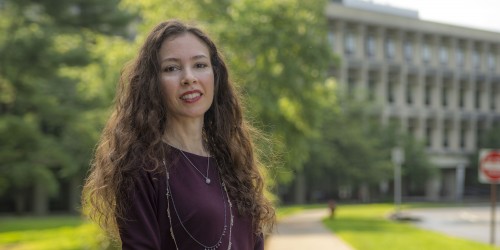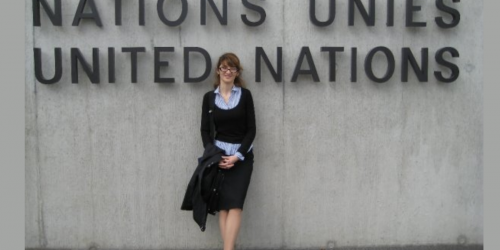
Making a positive social impact on new generations of leaders and entrepreneurs
Alumna Dr Ana Cristina Siqueira tells us about her inspiring career aligning economic, social, and environmental goals
Lucy alumna Julie (Human, Social and Political Sciences, 2015) talks about the Civil Service and offers some useful advice on studying sociology
I'm a senior policy advisor at the Department for Business, Energy and Industrial Strategy (BEIS). Here, I work on climate and international trade with a particular focus on trade between the EU and the UK from a climate perspective. Before joining my current team I worked on Brexit negotiations in the area of research policy.
I really enjoy what I do as I get to work on some of the most pressing issues facing humanity, trying to understand the complex inter-dependencies between domestic regulation, global trade, and bilateral and multilateral trade agreements and treaties in the global fight against climate change. One of these problems is carbon leakage which is what happens when domestic regulations are implemented as part of ambitions to drive down carbon emissions, causing increasing import of emission-intensive goods from countries with less ambitious regulatory regimes. In addition to working on issues I'm really passionate about, I've found BEIS to be a great place for me to develop and be challenged professionally.
I think my initial motivation to apply for a job in the Civil Service was the desire to utilise my knowledge about society and politics to make a positive difference to society. I'm fortunate to have ended up in a policy area I'm truly passionate about and where I'm constantly intellectually challenged. On top of this, the work-life balance in the Civil Service is, at large, good compared to many other places which is also important to me.
At university, I studied Human, Social and Political Sciences (HSPS) with a focus on Politics and Sociology, graduating in 2018. After Cambridge, I went on to do a Masters in European Politics and Policy at UCL.
HSPS is one of those degrees where you get a lot of transferable skills which are great, but it can sometimes feel a bit difficult to directly point at how your degree fits into your day-to-day job. I would say that having studied sociology has equipped me with a critical lens through which to understand the relationship between society and the individual and the structures that impact people's lives and opportunities. However, what I often found quite frustrating about sociology was that I felt like I was missing the answers to how the world can realistically be changed for the better. I'd like to think that that's what I'm working on now.
Having said that, I also think there is a big difference between studying and working. One piece of feedback I often got when writing academic essays was that I needed to improve my writing, making it more flowery to read. In my job I have often received positive feedback for having a more of a 'straight to the point' style of writing - clear subheadings and bullet points are the often best way of communicating your recommendations to senior colleagues and ministers.
In addition to this, I can't help but think that we worried a bit too much about everything as students. Every essay was stressful and felt hugely important. In reality it doesn't matter as much as I thought it did back then. No one has ever asked me since graduating which paper I chose in my second year or what degree I studied. My advice would be to just pick the course and papers you think you'll enjoy. It's easy to think that you need a First to be successful when you're at a top university surrounded by academics for whom getting a First was probably very useful in order to get funding for their PhDs and progress in their academic career. But I think that is a skewed picture, because you never meet the vast majority of graduates who didn't stay in academia and never really needed a First. I do think that getting a 2.i is helpful, but most job graduates apply for after university they're expected to show experience outside academia whether through student societies, summer jobs or volunteering. Looking back, I wish I had spent more time and energy on things I enjoyed whether academically or outside instead of trying to be tactical about my choices and focusing quite narrowly on exams.

Alumna Dr Ana Cristina Siqueira tells us about her inspiring career aligning economic, social, and environmental goals

Guljakhon talks about her studies, research and career within the United Nations

Lucy Alumna Anna Lappala (Physics 2011) on her latest research combining lab data with supercomputing power to understand chromosome dynamics